Contents
Saturday Opening
A New Acquisition Process
Training and Events
Borrowing Books from the Library
Black History Month
Dyslexia Awareness Week
Visiting the Libraries at the University of Oxford
Training Sessions Attended
New Acquisitions
Inner Temple Book Prize Shortlist
Saturday Opening
One of the four Inn Libraries is open from 10.00am to 5.00pm on each Saturday during the legal terms.
October
29 October: Middle Temple
November
5 November: Gray’s Inn
12 November: Inner Temple
19 November: Lincoln’s Inn
26 November: Middle Temple
December
3 December: Gray’s Inn
10 December: Inner Temple
17 December: Lincoln’s Inn
24 December: Closed
This timetable gives the latest details of the Saturday opening of all four Inn Libraries.
A New Acquisition Process
The Library has recently launched a pilot ‘Patron-Driven Acquisition Scheme’ (PDA).
For those who don’t necessarily speak ‘Librarian’, a quick explanation: In a nutshell, Patron-Driven Acquisition allows a Library user (Patron) to request books not currently in the Library collection. So far, so traditional … However, the PDA scheme goes one step further than the traditional ‘recommend a book’ approach. Any book which meets the basic criteria for selection is automatically purchased and added to the collection.
The hope is that this new scheme will sit alongside our traditional processes and enable us to be more responsive to user needs (Driven) by fulfilling requests in a timelier fashion.
The first request is already on the Library shelves: Virginia Dunn’s Be Civil! This is not a title often requested by practitioners, but one that is much fought over by Bar students. This purchase (Acquisition) marks the first step in ensuring that the Library collection contains the titles users want, alongside the ones we already know they need.
The long-established purchasing methods of our Books Committee will continue to ensure that the fundamental legal practitioner collection is maintained to its usual high standards. The pilot scheme will run for 12 months and, if it is successful, PDA will thereafter supplement our existing acquisition processes (at which point we will no doubt have to come up with a snappier name for the scheme).
See the Library website for the full criteria and request form.
Training and Events
Whodunnit?
On Tuesday 4 October we held the first of our new-style Library inductions for new Inner Temple students, which Tracey Dennis mentioned in the July newsletter. For the event we created a whodunnit mystery, entitled ‘The Curious Case of the Unconscious Librarian’.
The plot revolved around Tracey being found unconscious on the floor of the Library the morning after she had been working the evening shift with the potential suspects: Lily Rowe and James Rowles.

A trail of evidence was left around the Library, and the student participants needed to follow this in order to solve the mystery, in addition to learning about Library services and collections along the way.
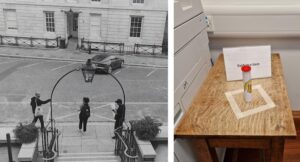
We trust this was an informative and enjoyable event for the students and we hope to build on this for future inductions.
Legal Research for Mooting: An Introduction
On 17 October James and Tracey gave a talk to members of the Inner Temple Mooting Society on legal research for mooting. The Library had been asked to run a session and we were very pleased to take up this offer.
The session was based around the two cases mentioned in the mooting instructions. Attendees were shown how to find reports of the cases, which involved using both the Cardiff Index to Legal Abbreviations and the Library’s catalogue, and required an understanding of how to interpret a neutral citation. After that they learned how to track the subsequent history of the cases. This was followed by an explanation of how to find commentary on the cases and on the legal topic of the moot.
We gave demonstrations of online searches using Lexis and Westlaw, as well as discussing the value of hard copy resources.
This was the first time the Library had done anything for the Mooting Society and, judging by the comments afterwards and the request for repeat sessions, it was a very successful (and enjoyable) initiative for all.
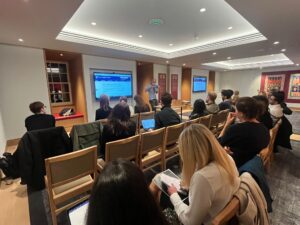
Online Training Session for MITAA
Following a recent visit to the Inn, representatives of the Malaysian Inner Temple Alumni Association (MITAA) asked if the Inn Librarians could deliver a legal research session to its members. Fast forward to the end of the summer, and the session was delivered on 8 September by the Librarian and Deputy Librarian. Attendance was robust and included a wide range of attendees representing all stages of legal study and professional practice. Master Faizah Jamaludin (President, MITAA), noted that the success of the talk could be measured by “the fact that there were more than 100 participants staying on until the end of a 1.5-hour webinar!”
Entitled ‘Legal Research Tips’, the talk covered everything from research skills, database use, advanced search techniques, free sources of legal information, and more. There were also some excellent questions from the audience – more than we had time to answer.
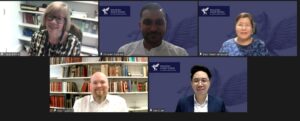
If you would like more information on the training we can provide to individuals or groups, please contact trainingsessions@innertemple.org.uk.
ICCA Legal Research Lecture
In September a cohort of ICCA students started Part 2 of their Bar course. This is hosted at the Inner Temple. A team of four librarians representing all the Inn libraries gave a lecture on legal research, followed a couple of weeks later by feedback sessions which sought to put into practice what students had learnt from the initial lecture.
The Deputy Librarian took part in the legal research presentation. She began the session by outlining the ten rules of legal research. A research scenario was introduced, and the rest of the session was based around that, the object being that students would be able to apply the principles of legal research to a given situation rather than thinking of research as an abstract set of instructions.
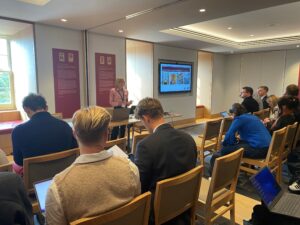
Librarians from the other Inns demonstrated how to undertake research using online and hard copy resources and outlined the benefits of each. The final part of the session touched upon some of the other kinds of research and legal materials the students may encounter.
The feedback we received was positive, and it was an enjoyable experience working with colleagues from all the other Inn libraries.
Qualifying Session
On 19 October Library staff took part in a Qualifying Session on legal research. This was a basic introduction covering such matters as deciphering legal abbreviations, understanding the hierarchy of citations, finding current versions of legislation and how to keep up to date with legal news.
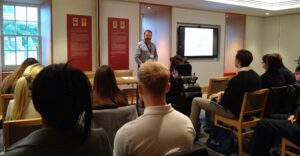
A more advanced session will be held in early 2023. In the meantime, users needing help with legal research can ask for a one-to-one session by contacting trainingsessions@innertemple.org.uk
Borrowing Books from the Library
There are three types of loan:
Overnight Loans – this covers books in the English textbooks collection in Room A, plus textbooks in the EU, Human Rights and Commonwealth collections. These books may be borrowed half an hour before the Library closes and must be brought back by 9.30am the following day.
Weekly Loans – books from the following collections may be borrowed for a week: Jurisprudence; Constitutional law; Legal Miscellany; and Scots Law. Weekly loans may be taken out at any time of the day but must be returned within one week.
Non-Law Collections – books from the following collections may be borrowed for 3 weeks: History; Learned Societies; Heraldry & Genealogy; Biography; Literature; Topography; and London.
Please ask at the Enquiry Point if you are uncertain which books may be borrowed.
Black History Month
For Black History Month we highlighted a selection of books from our legal biography collection, including some recently purchased titles.
Subjects include: George James Christian, Gifty Edila, Taslim Olawale Elias, Alfred Mangena, Rudy Narayan, Pixley ka Isaka Seme, Sir Hugh Worrell Springer, Leslie Thomas KC, Dudley Thompson, Alexandra Wilson and Henry Sylvester Williams.
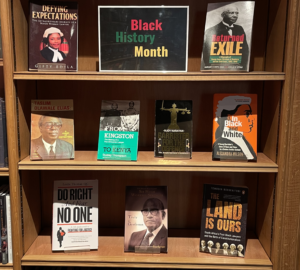
Dyslexia Awareness Week
Dyslexia Awareness Week #DyslexiaAwarenessWeek took place between 3 and 9 October this year. We are taking a look at how we support neurodiversity and now have a selection of study aids available at our Enquiry Point, including A4 coloured overlays, reading rulers (various colours), and coloured A4 lined paper.
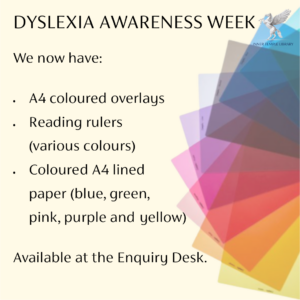
Visiting the Libraries at the University of Oxford
Lily Rowe, Graduate Trainee Librarian, writes
Over the summer months, I was fortunate enough to visit a range of law and non-law libraries in London and beyond. As an early-career librarian, I have found it useful to gain an insight into how other libraries interact with their users (such as through wellbeing initiatives and social media), shape their physical spaces, and manage and classify their collections.
The first stop on my tour was the University of Oxford where, along with two other library trainees from the Inns of Court – Abi and Lucy from Gray’s Inn – I was whisked around a variety of libraries by a wonderful group of Oxford’s own trainee librarians. More specifically, we were shown around both older and newer subject libraries (the 1960s Law Library, and the sixteenth- and seventeenth-century Old Bodleian and Radcliffe Camera), college libraries (St Edmund Hall and All Souls’), and a special collections library (the Weston).
The libraries of the four Inns of Court and those of the colleges and faculties of Oxford – known collectively as the “Bodleian Libraries” – are not too dissimilar. We all, for example: provide students and other researchers with access to a huge variety of important, and often unique, hard copy and digital material from across the ages; offer efficient remote document supply services; are always on hand to offer tailored research support and training sessions to users who need or want assistance, regardless of where they are in their career or whatever their background. That said, one noticeable, and essential, difference between Oxford and the Inner Temple Library, along with the libraries at the other Inns, is the nature and aim of the overall collections.
As one of the largest law faculties in the country, Oxford’s Law Library holds over half a million volumes of primary and secondary material that serve taught and research-based undergraduate and postgraduate courses, as well as post-doctoral academics and the wider university. That being the case, most of the collection originates from current or previous reading lists for course modules (such as jurisprudence, legal history, and Roman law), patron-driven acquisitions, and the legal deposit scheme (the Bodleian Libraries, along with five other libraries in the UK and Ireland, are entitled under the Legal Deposit Libraries Act 2003 to receive a copy of everything published in printed form in the UK and Ireland). Moreover, the Bodleian Law Library also accommodates an all-encompassing number of subjects and jurisdictions: in addition to the UK, it holds material on Commonwealth, US, and EU law, within a single building.
The character of this collection, then, differs slightly from those held here in the Inns in terms of both space and coverage, not least as our libraries aim primarily to provide as much practitioner-focused material to student and practising barristers as possible (for example, there are three copies of Civil Procedure 2022 [The White Book] in the Inner Temple Library alone, but there is only one in Oxford’s Law Library!), and our physical sites are both smaller and essentially independent of one another. Nevertheless, the Inner Temple Library does collaborate with the libraries of Middle Temple and Gray’s and Lincoln’s Inns (through the subject and jurisdiction specialisation schemes) to attain a level of breadth and depth of coverage equal to that of a major academic law library. Although each Inn library will acquire the same key textbooks, law reports, legislation, and journals, they will emphasise some subjects over others when acquiring new material. For example, the Inner Temple is the only Inn library to hold Card and English on Police Law, 16th ed. (Oxford University Press, 2022) or Halsbury’s Laws of Canada (LexisNexis, 2006-), as Police law and Canadian law are areas for which we have primary responsibility. However, much as any member of the University may use Oxford’s Law Library, any member of an Inn of Court has access to any Inn library and the material it holds; if one library does not have an item in their own collection, a member is able to contact or go to the one that does, or use its remote document supply service. It is no surprise that the Inns of Court, and by extension their libraries, were collectively known as ‘the third university of England’ alongside the Universities of Oxford and Cambridge.
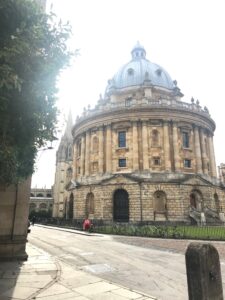

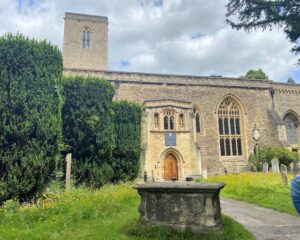
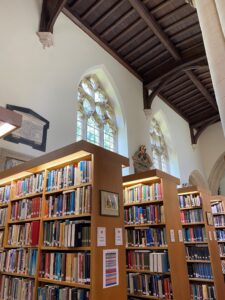
Training Sessions Attended
Tracey Dennis, Deputy Librarian, writes
I recently attended a webinar called ‘The Psychology of Consuming Online Information’. This was hosted by the City Legal Information Group. It was an interesting look at how online users cognitively respond to and process information in the moment and how this affects later decisions. The speaker looked at what influences how the brain stores and then processes information and highlighted some of the marketing tricks that are commonly used with online information.
Another session I attended explored the family law resources available on the online resource Practical Law. This was a helpful reminder of the wealth of material available via this resource. Of particular interest was the Family Global Guide. This takes the form of Q&A guides covering various jurisdictions, some of which Inner Temple Library specialises in. These guides offer a quick way to understand family law in over forty jurisdictions.
New Acquisitions
In recent years, the constitutional legitimacy of law officers has been questioned repeatedly because of recurring controversies surrounding the discharge of their varied functions. It has become increasingly clear that those functions enable law officers to play a highly influential part in the regulation and exercise of public power throughout the United Kingdom. Conor McCormick, in his The Constitutional Legitimacy of Law Officers in the United Kingdom (Hart) argues that the most persuasive framework for analysing the offices which make up this diverse regime involves concentrating on the constitutional values of independence, accountability and trust which underpin it. The offices under consideration are the Attorney General and Solicitor General for England and Wales, the Counsel General for Wales, the Lord Advocate, Solicitor General and Advocate General for Scotland, and the Attorney General and Advocate General for Northern Ireland.
Mandy Burton, in Domestic Abuse, Victims and the Law (Routledge) provides the reader with a thorough understanding of the remedies available to victims in the civil, family and criminal law. She contends that expectations of the legal remedies have increased as the number and scope of remedies has proliferated. She further examines how legal responses to domestic abuse have evolved over the past decade and explores how the victim’s rights narrative and associated litigation, which has become prevalent in legal discourse and criminal justice reforms, has shifted expectations and impacted domestic abuse policy and law.
Gypsy and Traveller Law, edited by Marc Willers KC and Chris Johnson (Legal Action Group) is not an entirely new work, being in its third edition, but it is new to this Library. It brings together the areas of law affecting the travelling community: accommodation needs such as planning, site provision, homelessness and eviction, as well as other issues impacting on the day to day lives of gypsies and travellers such as education, health care and race discrimination. The editors combine straightforward, practical advice with comprehensive coverage of the statutes, regulations, guidance, circulars and a rapidly developing body of case-law.
Law and Religion in the Commonwealth: The Evolution of Case Law, edited by Renae Barker, Paul Babie and Neil Foster (Hart) represents a notable addition to our Commonwealth textbooks collection. Each chapter focuses on a specific case from a Commonwealth jurisdiction, examining the history and impact of the case, both within the originating jurisdiction and its wider global context. The cases are divided into four sections covering (i) foundational questions in law and religion; (ii) freedom of religion around the Commonwealth, (iii) religion and state relations around the Commonwealth, and (iv) rights, relationships and religion around the Commonwealth. The non-UK jurisdictions featured are Australia, Malaysia, Canada, Nigeria, India, South Africa and Pakistan.
We would like to express our thanks to the following, who have presented books to the Library recently: Mohammud Jaamae Hafeez-Baig for The Law of Tracing; Master Michael Humphries for National Infrastructure Planning Handbook, 4th edition; Master Lawrence Collins for Dicey, Morris and Collins on the Conflict of Laws, 16th edition; and Henk van Klaveren for Report of the Bloody Sunday Inquiry.
A list of new law titles and editions received from July to September is available.
Inner Temple Book Prize Shortlist
The Book Prize was inaugurated in 2008 to mark the Inn’s long-standing commitment to legal scholarship and the education of law students and of lawyers in practice. The Prize attracts entries from every part of the globe, and has already become one of the highest honours that legal authorship can aspire to.
The patron is HRH The Princess Royal KG KT GCVO QSO and the prize is sponsored by Wildy and Sons Ltd.
The Inner Temple Book Prize judging panel is pleased to announce that the following books have been selected for the shortlist:
Main Prize
N.W. Barber: The Principles of Constitutionalism
Oxford University Press
Jo Braithwaite: The Financial Courts: Adjudicating Disputes in Derivatives Markets
Cambridge University Press
Neil Duxbury: The Intricacies of Dicta and Dissent
Cambridge University Press
Richard Helmholz: The Profession of Ecclesiastical Lawyers: An Historical Introduction
Cambridge University Press
New Authors Prize
Joanna Bell: The Anatomy of Administrative Law
Hart Publishing
Joshua Hitchens and Niamh Daly: Forced Marriage Law and Practice
Bloomsbury
Richard Martin: Policing Human Rights: Law, Narratives, and Practice
Oxford University Press
The winner of the Main Prize will be awarded £12,000 and each of the other shortlisted candidates £500. The winner of the New Authors Prize will receive £5,000 and any other shortlisted candidates £300.

